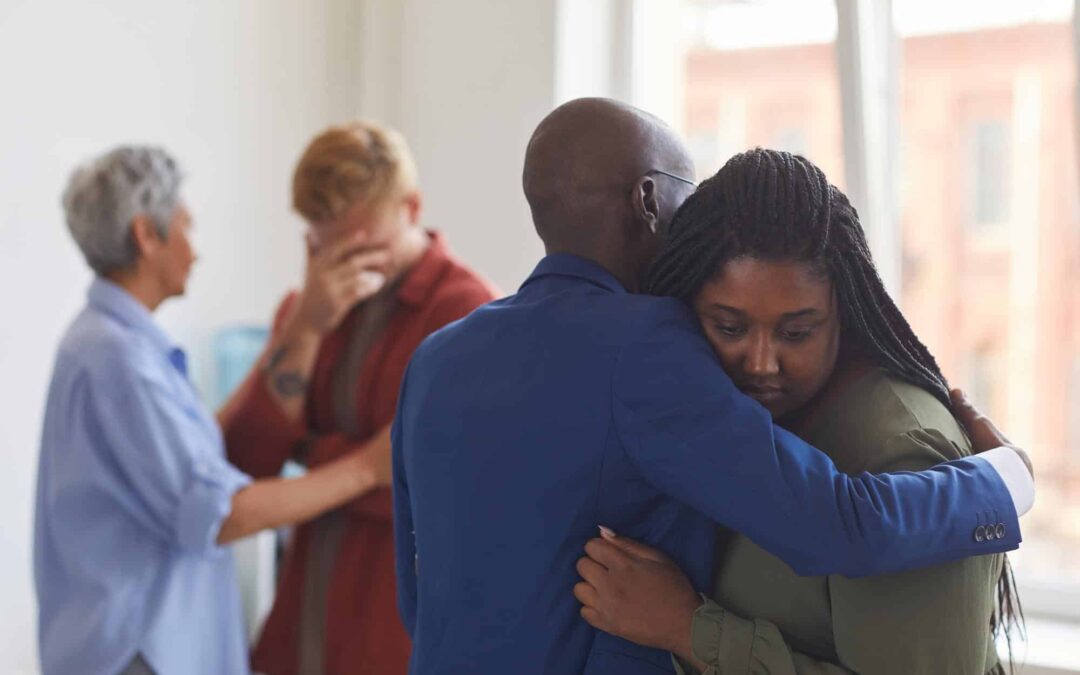Conflict in Sobriety: Challenges and Importance of Healthy Management

Navigating conflict during recovery presents unique challenges that can test your sobriety. Conflict in sobriety involves managing disagreements and emotional tensions without the numbing shield of substances – a skill many of us need to develop from scratch.
The Impact of Addiction on Conflict Response
Addiction rewires our brain’s conflict response systems, often leaving us with:
- Heightened emotional reactions
- Impaired impulse control
- Difficulty processing stress
- Limited problem-solving abilities
These impairments create a dangerous cycle: interpersonal conflicts trigger stress, stress intensifies cravings, and unresolved disputes can push you toward relapse. Research shows that relationship conflicts rank among the top relapse triggers for people in recovery.
Understanding Your Triggers
Your body and mind need new tools to handle emotional stress. Common conflict triggers include:
- Family disagreements
- Workplace tensions
- Financial disputes
- Relationship challenges
Learning healthy coping mechanisms becomes essential for your recovery journey. These skills help you:
- Process emotions without substances
- Communicate needs effectively
- Maintain boundaries
- Build stronger relationships
Developing these abilities takes time and practice, but mastering conflict management strengthens your recovery foundation. Each successfully managed dispute builds confidence in your ability to handle life’s challenges while maintaining sobriety.
Foundations of Effective Communication in Addiction Recovery
Effective communication is crucial for successful addiction recovery. It plays a vital role in expressing thoughts, feelings, and needs, which directly affects the healing journey and the process of rebuilding relationships. Understanding the psychology of addiction, including why we get addicted, can also provide valuable insights during this phase.
Essential Elements of Sober Communication:
- Radical Honesty: Speaking your truth without minimizing or exaggerating experiences helps build trust and authenticity in relationships.
- Assertiveness: Expressing needs and boundaries clearly while respecting others’ rights and feelings.
- Active Empathy: Understanding others’ perspectives by putting yourself in their shoes and validating their experiences.
Learning to communicate effectively requires practice and specific tools. Using “I” statements shifts conversations from blame to personal responsibility:
- “I feel hurt when…” instead of “You always…”
- “I need…” rather than “You never…”
- “I think…” versus “You should…”
Reading Non-Verbal Signals:
- Body language
- Facial expressions
- Tone of voice
- Physical distance
- Eye contact
These subtle cues often reveal deeper meanings behind spoken words. By developing awareness of non-verbal communication, you can better understand others’ true feelings and respond appropriately.
Mastering these communication tools creates a foundation for healthy relationships in recovery. Each interaction becomes an opportunity to practice these skills and strengthen your support network. For more resources on communication skills and recovery, consider exploring further into this essential aspect of the recovery process.
Strategies for Managing Conflict Without Using Substances

Managing conflict in recovery requires a proactive approach rather than falling back on old patterns of avoidance or aggression. You can start by taking deep breaths and pausing before responding to tense situations. This creates space for thoughtful reactions instead of impulsive behaviors.
Root Cause Analysis
When conflicts arise, it’s essential to dig deeper and understand the underlying issues at play. Ask yourself the following questions:
- What triggered the conflict?
- What needs aren’t being met?
- Are there underlying fears or concerns?
- How might the other person be feeling?
Emotional Regulation Techniques
Emotional regulation becomes your strongest ally during disputes. Try these proven techniques:
- The 5-4-3-2-1 Method: Name 5 things you see, 4 things you feel, 3 things you hear, 2 things you smell, and 1 thing you taste
- Temperature change: Hold an ice cube or splash cold water on your face
- Progressive muscle relaxation: Tense and release each muscle group
- Grounding exercises: Focus on physical sensations to stay present
Maintaining Respectful Dialogue
When engaging in difficult conversations, maintain respectful dialogue by:
- Speaking at a measured pace
- Asking clarifying questions
- Acknowledging the other person’s perspective
- Suggesting specific solutions
- Taking breaks when emotions run high
Remember that conflict resolution skills improve with practice. Each challenging interaction becomes an opportunity to strengthen your recovery toolbox without turning to substances.
Healthy Coping Mechanisms Supporting Conflict Resolution in Sobriety
Building a toolkit of healthy coping mechanisms strengthens your ability to navigate conflicts while maintaining sobriety. Here are some effective strategies:
1. Mindfulness Meditation
Mindfulness meditation creates emotional balance by helping you stay present and respond thoughtfully rather than react impulsively during challenging interactions. A simple 5-minute breathing exercise can reset your nervous system when tensions rise.
2. Physical Exercise
Physical exercise serves as a powerful stress relief tool. Activities like running, yoga, or weight training release endorphins that naturally boost your mood and clear your mind. These natural “feel-good” chemicals provide a healthy alternative to substances when dealing with conflict-related stress.
3. Creative Expression
Creative expression through journaling or art offers a safe outlet for processing complex emotions:
- Write uncensored thoughts in a recovery journal
- Sketch or paint your feelings
- Create music or poetry to express difficult emotions
- Use coloring books for mindful stress relief
4. Positive Reframing
Positive reframing helps shift your perspective during conflicts. Instead of viewing disagreements as threats, try seeing them as opportunities for growth and deeper understanding. Adding appropriate humor can lighten tense situations and create connection – just ensure it’s not used to deflect from addressing important issues.
These coping tools work best when practiced regularly, not just during conflicts. By incorporating them into your daily routine, you’ll build resilience and emotional stability that serves you in challenging moments.
Building and Rebuilding Relationships Through Communication Skills
Restoring relationships damaged by addiction requires dedication, patience, and authentic communication. Open dialogue creates space for healing, allowing both parties to express their feelings, fears, and hopes. You can start rebuilding trust by:
- Being consistently honest about your recovery journey
- Acknowledging past hurts without defensiveness
- Following through on commitments, no matter how small
- Respecting boundaries set by others
However, it’s essential to recognize that some relationships may have devolved into codependency, a situation where one person’s needs overshadow the other’s. Understanding the signs of codependency can help in addressing these issues effectively.
The Importance of Active Listening
Active listening plays a vital role in relationship repair. When you truly listen, you validate others’ experiences and help them feel heard. Practice these active listening techniques:
- Maintaining eye contact
- Asking clarifying questions
- Reflecting back what you’ve heard
- Avoiding interruptions or preparing responses while others speak
Building a Support Network
Your support network serves as both a foundation and accountability system for maintaining healthy relationships. Consider building connections with:
Recovery Peers
- Share similar experiences
- Understand unique challenges
- Offer practical coping strategies
Family and Friends
- Provide emotional support
- Help maintain accountability
- Celebrate recovery milestones
Professional Support
- Therapists guide relationship healing
- Mentors share recovery wisdom
- Counselors teach communication skills
Strong communication skills strengthen your sobriety by creating genuine connections and reducing isolation. Each positive interaction builds confidence in your ability to maintain meaningful relationships without substances.
Integrating Therapy and Support Systems for Conflict Management
Professional therapy provides essential tools for mastering conflict resolution in recovery. Cognitive Behavioral Therapy (CBT) helps you identify negative thought patterns that fuel conflicts, while Dialectical Behavior Therapy (DBT) teaches specific skills for emotional regulation during challenging interactions.
Group Therapy: Practicing Communication Skills
Group therapy sessions create a safe environment to practice new communication techniques. This can involve role-playing difficult conversations, receiving real-time feedback from peers, learning from others’ experiences, and building confidence through repeated practice.
The Role of Your Support System
Your support system acts as a vital safety net during conflict resolution:
- Sponsors guide you through challenging situations
- Recovery peers share successful strategies
- Family members provide emotional backing
- Therapists offer professional insights
Identifying Patterns and Red Flags
Regular check-ins with your support network help identify patterns in your conflict management style. These interactions reveal blind spots you might miss on your own.
Red flags that signal the need for professional intervention include:
- Recurring arguments about the same issues
- Inability to maintain boundaries
- Persistent feelings of anger or resentment
- Withdrawal from social connections
Individual Therapy: Addressing Underlying Issues
Individual therapy sessions allow deep exploration of underlying trauma or unresolved issues that may surface during conflicts. This targeted work strengthens your ability to navigate disagreements while maintaining your sobriety.
Taking the Next Step Toward Sober Communication Mastery
Your journey to mastering sober communication starts now. Make these tools part of your daily routine:
- Practice active listening in every conversation
- Use “I” statements when expressing feelings
- Take deep breaths before responding in tense situations
- Write down communication wins in your recovery journal
Ready to strengthen your conflict management skills? Our dedicated team at Resolute Recovery offers personalized support through:
- One-on-one counseling sessions
- Group therapy workshops
- Communication skills training
- Ongoing recovery support
Remember: Strong communication skills don’t just help you handle conflicts – they build the foundation for lasting sobriety and meaningful relationships. Reach out today to explore our sober living programs and take control of your recovery journey.
Contact us to learn more about our personalized recovery support options.





